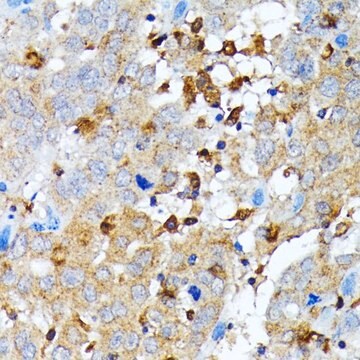01110916
E11
fish (whole), Fibroblast
Autenticatiper visualizzare i prezzi riservati alla tua organizzazione & contrattuali
About This Item
Codice UNSPSC:
41106514
NACRES:
NA.81
Prodotti consigliati
product name
E11, from Snakehead fish
Origine biologica
fish fish (whole)
Modalità di accrescimento
Adherent
Cariotipo
Not specified
Morfologia
Fibroblast
Prodotti
Not specified
Recettori
Not specified
tecniche
cell culture | mammalian: suitable
Condizioni di spedizione
dry ice
Temperatura di conservazione
−196°C
Origine della linea cellulare
Snakehead fish, whole fry tissue
Descrizione della linea cellulare
E11 is a clone of the cell line SSN-1 and is persistantly infected with a C-type retrovirus (SnRV). It is susceptible to piscine nodavirus strains belonging to different genotypes (SJNNV, RGNNV, TPNNV and BFNNV - striped jack, red spotted grouper, tiger puffer and barfin flounder nervous necosis viruses repectively). E11 is highly permissive to nodavirus infection and production. An advantage of E11, over the parental line SSN-1, is its steady, faster growth to confluency and longer stability in monolayer cultures for 2 weeks at 25 °C or 4 weeks at 20 °C and its reproducible, clear CPE characterised by cytoplasmic vacuole formation followed by intensive disintegration.
Terreno di coltura
L15 + 5% Fetal Bovine Serum (FBS)+ 2 mM Glutamine
Mantenimento delle subcolture
Split sub-confluent cultures (70-80%) 1:4, ie., seeding at 3 x10,000 cells/cm2 using 0.05% trypsin/EDTA. No CO2. Culture at 25 °C
Altre note
Additional freight & handling charges may be applicable for Asia-Pacific shipments. Please check with your local Customer Service representative for more information.
Cultures from HPA Culture Collections and supplied by Sigma are for research purposes only. Enquiries regarding the commercial use of a cell line are referred to the depositor of the cell line. Some cell lines have additional special release conditions such as the requirement for a material transfer agreement to be completed by the potential recipient prior to the supply of the cell line. Please view the Terms & Conditions of Supply for more information.
Depositor and originator: Professor Toshihiro Nakai, PhD Laboratory of Fish Pathology Graduate School of Biosphere Science Hiroshima University 1-4-4 Kagamiyama, Higashi-Hiroshima Hiroshima 739-8528, Japan
For complete product information, please see ECACC
Esclusione di responsabilità
This cell line has special release conditions: All customers are required to complete a Cell line Release Authorisation form.
Codice della classe di stoccaggio
10 - Combustible liquids
Classe di pericolosità dell'acqua (WGK)
WGK 3
Punto d’infiammabilità (°F)
Not applicable
Punto d’infiammabilità (°C)
Not applicable
Certificati d'analisi (COA)
Cerca il Certificati d'analisi (COA) digitando il numero di lotto/batch corrispondente. I numeri di lotto o di batch sono stampati sull'etichetta dei prodotti dopo la parola ‘Lotto’ o ‘Batch’.
Possiedi già questo prodotto?
I documenti relativi ai prodotti acquistati recentemente sono disponibili nell’Archivio dei documenti.
Pitchaporn Waiyamitra et al.
Pathogens (Basel, Switzerland), 9(11) (2020-11-12)
Tilapia lake virus (TiLV) causes an emerging viral disease associated with high mortality and economic damage in tilapia farming around the world. The use of probiotics in aquaculture has been suggested as an alternative to antibiotics and drugs to reduce
T Iwamoto et al.
Diseases of aquatic organisms, 43(2), 81-89 (2001-01-06)
Six cell clones were derived from the SSN-1 cell line, which is composed of a mixed cell population and persistently infected with a C-type retrovirus (SnRV). These clones were susceptible to 4 piscine nodavirus strains belonging to different genotypes (SJNNV
Il team dei nostri ricercatori vanta grande esperienza in tutte le aree della ricerca quali Life Science, scienza dei materiali, sintesi chimica, cromatografia, discipline analitiche, ecc..
Contatta l'Assistenza Tecnica.




